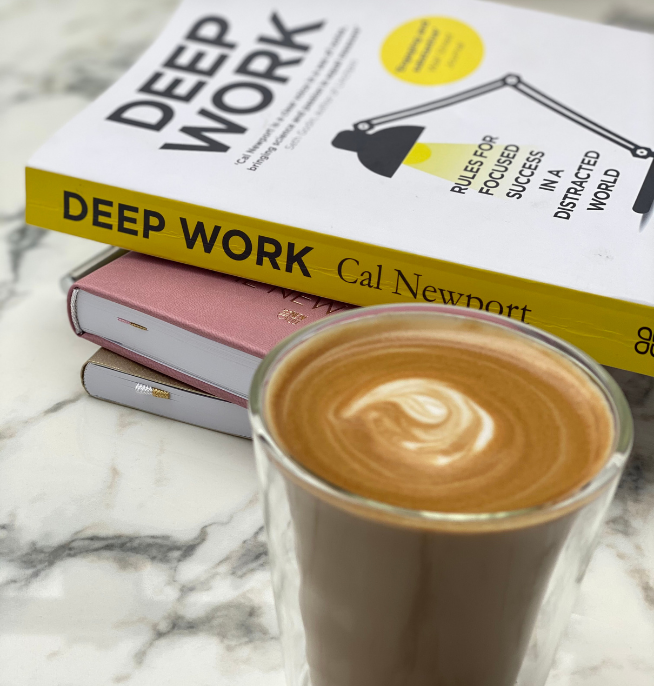I find myself often frustrated with the feeling of ‘not doing enough’, getting to the end of a busy day and wondering what real value I’ve created or added. A thought that often plagues me and has had me constantly pent up with nervous energy in the past, I’ve spent years and years trying out and testing every productivity hack, concept, scheduling tool you can think of. In comparison to everything I’ve studied on this topic, this book is profound. I used to say and still do say things like, “right I’m going deep” which was code for I’m going to do some thinking, work on something deep or some kind of creating that required a zen like environment without a pin drop or hint of interruption. It’s how I’ve always been, pretty much as long as I can remember. Maybe it was my Montessori start in life, always working in three hour sprints with deep focus on one activity, having a break and then repeating.
As a result of my predisposition and infatuation with productivity, this book caught my attention and I was sucked in. Hanging on every word. No doubt one of the rare books that I will read again (so please don’t ask to borrow my copy). Cal Newport, a computer science professor at Georgetown University and New York times bestselling author really is a ‘clear voice in a sea of noise.’
What I loved about this book
“Busyness as a Proxy for Productivity”. I’ve often said as a reminder to myself and to clients, “busy is not a badge of honour” and I’m not claiming that quote at all. One of the things that resonated with me in this book was Cal talking about productivity. What I took away from this was that we need to define productivity for ourselves first of all and separate that from busyness. Answering emails every minute of the day, lots of meetings about meetings and Slack messages going ping, ping, ping can make you look busy, but is that productive?
How often have you been working on a task, maybe it has an importance level of three out of three and while doing that task you open up a web browser to search for some information. Then you notice an email in the inbox or a slack message, you think ‘this will only take 2 minutes to reply’ but now your train of thought is interrupted. You go back to the fresh web browser and have no idea what you were going to search for in the first place. Just me?
In one chapter Cal analyses the last five emails he had sent before writing that particular chapter. He wanted to highlight the shallow concerns that are constantly vying for your attention on a daily basis. They range from benign to a frustrating string of emails simply trying to arrange something in the diary. I did the same and it was a revelation, how much time we can spend on the benign.
What are the last five emails that you sent? Personally I’m looking forward to getting hold of Cal’s new book, ‘A World Without Email’.
A few challenging ideas
Absolutely on board neurological, psychological and philosophical arguments for deep work and I really believe in our modern days that it’s becoming an increasingly valuable activity, trait, ability.
The book lays out rules for transforming your work life into one of deep work. They’re practical, there are various options and I think that is key - finding a blend of what works for you and your circumstances. We can’t all be Bill Gates and disappear to a fancy retreat for two weeks to think, nor can we build a secluded cabin on the edge of a lake or stay in a luxurious hotel near Edinburgh Castle. What I’m saying is that the journey to productivity is not a straight line, I don’t think it’s as hard and fast as the rules written out in the book. It possibly starts by gently setting boundaries, building that up and getting strict with yourself. Boundaries are something I’ve talked about before in one of my podcasts (I kind of wish I’d read this book before I recorded that but good to know I’m on right track).
First decide that you’re going to try Deep Work. Then look at where you’ll work, for how long, the rituals and your measure of productivity and how you will support your deep work endeavours. Maybe it’s starting with a great coffee, a walk or something that will signify and tell your brain ‘hey, get ready because we’re going deep.’ I’m so well trained now I can say the words ‘I’m going deep’ and I’m in. After years of battling with concentration at school, it’s a skill that I’ve cultivated and will keep working at for the rest of my working life.
One of the things I’ve done since reading the book is have a good clear out of my office, turned it into my little zen paradise. Very lucky that I do have that space but I’ve really made it mine and made it a comfortable, tidy, clean space to work in.
One of the other highlights in the rules and disciplines that Cal talks about is accountability. I guess as a coach I’m a big fan of this, “a rhythm of regular and frequent meetings of any team that owns a wildly important goal”. Having a scorecard to track the activity and commitment to specific actions with regular enough review for it to have an impact, HELLO you’re signing off my hymn sheet Cal.
Highlights
Throughout the book, I had many revelations and there are so many things I want to implement. If I personally had to choose one single thing from the book, it’s the idea of a shutdown ritual at the end of the working day. Downtime is just as important for your cognitive repair, to recharge your batteries and let you come up with solutions when your subconscious mind gets to do its thing. Very often, especially now in this post-covid world when leaving work just means leaving the dining table, the spare room or the home office, we don’t have much separation from work-downtime. It means that even though work is done for the day your brain is still in work mode. I know this is one of my weaknesses and running over your to do list in your mind on repeat doesn’t make for a restful evening where you can focus on your family and be present.
I know it will take time and I will need to remind myself regularly but at the end of work, it’s time to check over emails one last time, capture things that need to be done or completed so they are out of mind, make a note of things in the calendar for the next day, shutdown the computer and say ‘we’re done for the day’ out loud.
Creating my shutdown ritual since I read about the Zeigarnik effect in Cal’s book has been hugely beneficial and I’ve not long started it. I have had far fewer sleepless nights as my attention isn’t still consumed by unfinished business. I’m not perfect yet but this one ritual that takes me 15 minutes at the end of the working day has been profound. I’d recommend anyone to give it a go.
Rating
Engaging, intelligent, meaningful. This book gets five stars from me. You know those days you have before you go on holiday and you’re like a superhuman machine eating productivity for breakfast after superman peed in your porridge? Yeah, if you’re an overachiever and chase days like that then this book is for you.
Enjoy the read. I’d love you to send me a message on social and share your biggest takeaway from the book!
For more things on my bookshelf, check the resources section.



